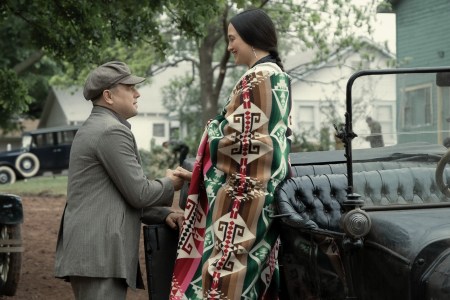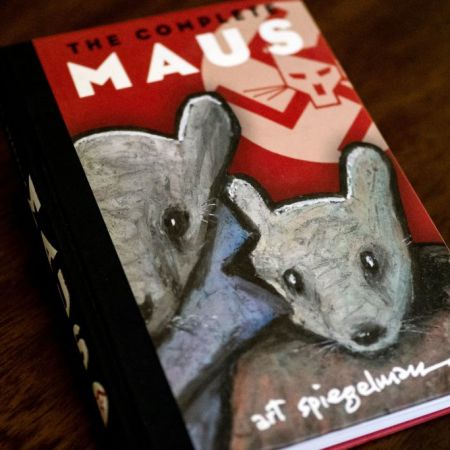Last week, the Academy of Motion Picture Arts and Sciences announced the nominees for its annual awards — including what may be the most radically uncommercial movie ever selected to compete for the top prize at the Oscars. Peruse the full list of films nominated for Best Picture over the last century and you’ll encounter adventurous outliers: Ingmar Bergman’s crimson-hued art-house classic Cries & Whispers, Terrence Malick’s eon-spanning memory poem The Tree of Life, Ryusuke Hamaguchi’s three-hour epic of Chekhovian recovery Drive My Car. But none of those unlikely contenders look quite as unlikely as this year’s, a nightmare domestic drama leached of anything resembling traditional drama. Seriously, have the Oscars ever recognized an experiment as pitiless and uncompromising as The Zone of Interest?
It’s not simply that writer-director Jonathan Glazer has deprived his audience of a rooting interest, forcing us into the uncomfortably close company of Rudolf Höss, the real-life Nazi commandant who lived next door to the concentration camp he ran. It’s that he’s approached his source material, the novel by Martin Amis, from a rigorously formal and anti-dramatic remove. For two hours, we’re basically just observing the home life of this human monster, his wife and his children — a dispassionate, nearly plotless accumulation of daily routines that happen to unfold on the literal periphery of unspeakable evil. The horrors of Auschwitz are merely implied, conveyed primarily via offscreen sounds and faint visual cues like puffs of smoke or locomotive steam. It’s closer in spirit to Jeanne Dielman than Schindler’s List.
None of this could be less Academy-friendly, or further from what we tend to think of as an “Oscar movie.” Except in one fundamental respect: Beyond its antagonistically extreme approach, The Zone of Interest is a Holocaust drama. And that subject matter has always drawn recognition from Hollywood’s most prestigious voting body. In fact, the presence of Glazer’s bleak vision in the Best Picture category — a major exception to the traditionally tonier tastes of AMPAS, a nominee almost unprecedented in its lack of mainstream appeal — might be the ultimate demonstration of how powerless the Academy is to resist stories about history’s darkest chapter, regardless of what shape they take.
It’s become a cliche or even an easy joke to point out that Holocaust dramas tend to do well at the Oscars. But that impression doesn’t come from nowhere. Writing about the subject back in 2012, legendary film critic J. Hoberman identified 20 nominated features from 1959 to present day that “treated the Holocaust from the perspective of its victims,” going on to note that only two of them failed to win anything. A dozen years later, that tally has naturally grown, as the Academy has gone on to honor such tonally, stylistically disparate movies as Ida, Son of Soul and the woefully sentimental Jojo Rabbit.
The Academy’s affinity for movies about the Holocaust goes back to the earliest examples: Carol Reed’s 1940 Night Train to Munich, which is often cited as the first movie to reference Hitler’s concentration camps (years before they were liberated), was nominated for Best Original Story at the 14th Academy Awards. Four years later, the same category made room for None Shall Escape, now considered the first feature film to address the Nazi atrocities committed against Jews. Before the war was even over, its evils were creeping into Hollywood movies — and into the Oscar ceremonies celebrating their achievements.
By the 1960s, the Academy was regularly recognizing films — like The Diary of Anne Frank, Judgment at Nuremberg, and the Polish quasi-documentary Passenger, an ancestor of The Zone of Interest in its focus on an officer of the camps — that sought to dramatize or memorialize the events of the Holocaust. Nonfiction films on the subject would come to frequently compete in the documentary categories, though the Academy curiously ignored the most revered of them all: Alain Resnais’ elliptical Night and Fog and Claude Lanzmann’s exhaustive, devastating Shoah. This year, The Zone of Interest will probably win Best International Feature (formerly Best Foreign Language Film), a category that’s often played host to dramas that take place under the long shadow of the Third Reich.
Several actors have won Oscars for playing victims or survivors of the Holocaust, including Meryl Streep, Roberto Benigni, Adrien Brody, and Shelley Winters (who donated her statuette for The Diary of Anne Frank to the Anne Frank House). Meanwhile, the tricky task of portraying Nazis — and maybe trying to understand them — caught Laurence Olivier, Ralph Fiennes, Christoph Waltz, Kate Winslet, and more a chance at Oscar glory. And of course there was Schindler’s List, a cultural phenomenon from Hollywood’s biggest hitmaker, proving he had finally grown up by tackling the weightiest of historical topics. Though Spielberg’s film inspired heated debate about the limits of representation (was it obscene to dramatize what happened in the camps?), it was nominated for a nearly-record 12 Oscars and won seven.
The Holocaust is the defining trauma of the 20th century — an event of unfathomable enormity that reshaped the world in a political, cultural, moral, and diasporic sense. We’ll probably spend the rest of history trying to collectively wrap our heads around it. Why wouldn’t the Oscars reflect that undepletable interest? More cynically, one might wonder if films about the Holocaust are attractive to an industry determined to assert its own importance annually. If the Oscars partially exist to tell the world that movies should be taken seriously, it makes sense that they’d regularly lift up films about the most serious subject matter imaginable, a historical event whose impact can’t be overstated.
“Killers of the Flower Moon,” “May December” and American Myth-Making Dominate Cannes
The new films from Martin Scorsese and Todd Haynes are the highlights of the festival so farIf the impression of consequence is what draws the Academy to these dramas again and again, The Zone of Interest fits the bill. Executed with a downright Kubrickian clarity of vision, it’s a movie heavy with the weight of awful history; the almost forensic docu-realism of Glazer’s gaze, fixed upon the day-to-day just beyond the walls of the camp, brings the past to life in its all queasy mundanity. As difficult as the movie is to watch at times, it’s even more difficult to ignore.
Yet it’s still rather remarkable to see Zone competing for Best Picture, so sharply does it deviate from what’s characterized the Holocaust dramas the Academy has honored in the past. It is not a story of perseverance, of survival or spiritual transcendence. It finds no glimmer of hope in tragedy, no larger tribute to the human will. The closest consolation it offers is the premonition of an ending to the barbarism — the glimpse of a future where its protagonist, a wormy functionary, is remembered as a mere instrument of evil if he’s remembered at all. The real Höss faced a pretty dramatic comeuppance: hunted down by deputized survivors of the camp, hanged for his sins at Auschwitz while some of the people he terrorized but didn’t end up exterminating watched. There’s a Basterds-like thriller of justice served in that story. Glazer doesn’t tell it. His version does not aim for catharsis or reassurance.
One of the strangest habits of Holocaust cinema is the search for signs of humanity’s goodness in the clearest evidence to the contrary. That kind of sentimentalism is the sugar that makes the bitterest pills go down a little more smoothly. It’s how you get a supposed “anti-hate satire” like Jojo Rabbit, the last movie to dig an Oscar out of the ashes of Hitler’s Final Solution. Even a drama as harrowing as Son of Saul, which finds a different way to abstract the unbearable sights of Auschwitz (shifting them out of focus or into the far background of the frame), becomes a story of one man achieving emotional, psychological and maybe spiritual deliverance while navigating Hell on Earth.
In The Zone of Interest, the victims are a great structural absence: The movie keeps them almost entirely offscreen — as a scream, a discovered bone, a pile of shoes in a museum. It wants to convey the scope of those Schindler couldn’t save, the staggering volume of those not on his list. It’s among the only narrative films of its kind — certainly the only one to earn the Academy’s stamp of approval — to look at the Holocaust as part of the wallpaper fabric of a person’s ordinary life, the job he does off-camera like a sitcom dad stepping off stage.
And in Christian Friedel’s portrayal of Höss, The Zone of Interest reaches beyond a binary depiction of Nazism. He is neither the mustache-twirling villain — begging to be punched out by Indiana Jones or Captain America — nor the conflicted conscience of the death machine. He is an inscrutable enigma of bureaucratic inhumanity, a careerist doing his dark job best he can, compartmentalizing the evil he performs daily. He loves his wife and his kids and his dog and his horse. He doesn’t think too much about the death happening next door. What The Zone of Interest says, discomfitingly, is that the Nazis were just like us. Given the screams currently coming from beyond the walls of our polite society, it’s a point difficult to protest.
This article appeared in an InsideHook newsletter. Sign up for free to get more on travel, wellness, style, drinking, and culture.


























